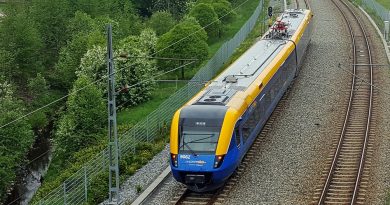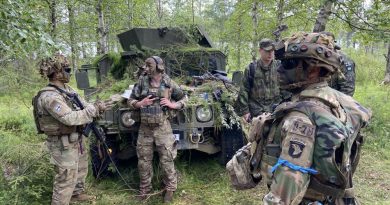Nunavik tourism reopening reason for optimism, vaccination uptake still a concern
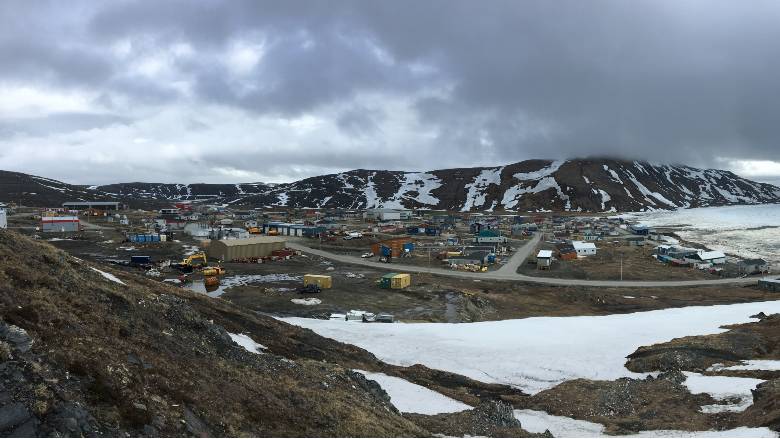
Nunavik’s reopening for tourism this month is a reason for optimism say local authorities, but low vaccination uptake remains a concern.
Tourists have been allowed to visit Nunavik, the Inuit region of Arctic Quebec, since June 21, a decision made after a period of decreasing COVID-19 numbers across the province, and only one confirmed local case of COVID-19 in the prior three months.
“We saw quite an important decrease in the number of cases down South, even more than I was personally expecting,” Dr. Marie Rochette, the director of public health for the Nunavik Regional Board of the Health and Social Services, said in a phone interview.
“So because of that, along with the last three months we’ve had in Nunavik, we thought it’s quite safe to open to tourism considering all those factors.”
Tourists planning to travel to Nunavik are required to fill out a Nunavik Territory Access Authorization (NTAA) form online a minimum of 72 hours before departure to the region. They also need proof of having had a COVID-19 test between 48 and 72 hours before their flight, and have a second test seven days after arriving.
Those who have have not had two doses of the COVID-19 vaccine, or have received their second vaccine doses within 14 days of visiting Nunavik, will be required to quarantine for 10 days.
Masks will still be required on flights and when out in public.
Delta variant remains wildcard
Nunavik has a population of approximately 13,000 people, with 14 communities in the region. All the communities are fly-in only. Two communities have small hospitals with the rest served by nursing stations.
Because of limited medical resources in the region and the isolation of the communities, strict public health measures have been in place since the start of the pandemic.
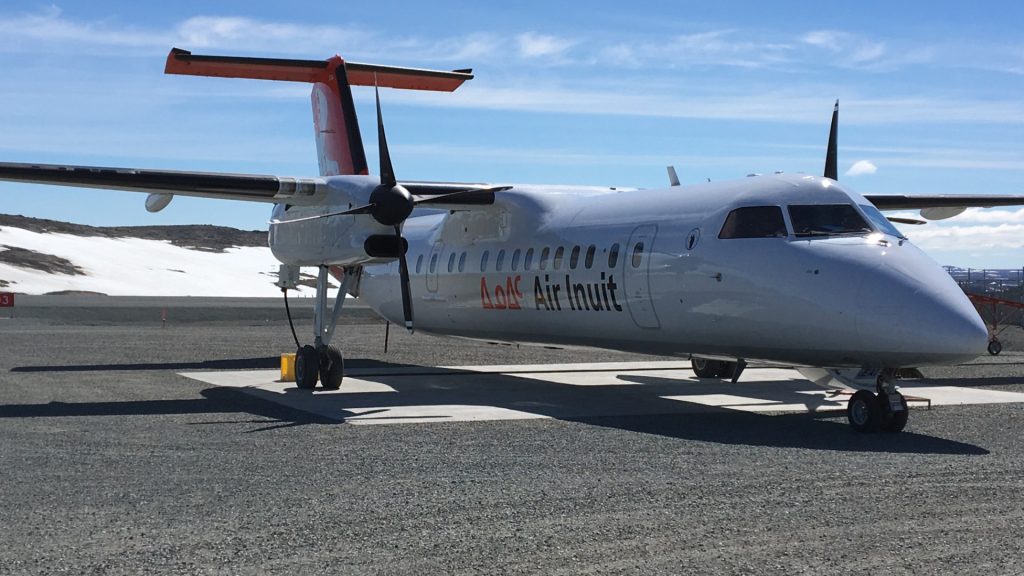
Montreal is the main transport hub to and from Nunavik.
As of Monday, all of Quebec was moved to “green zones” the lowest COVID-19 alert level in the province. (Nunavik is managed separately and has their own COVID-19 alert system.)
Rochette said the trend remains promising but that health officials continue to monitor the situation in Nunavik and will adjust travel rules if necessary.
Variants, especially the more contagious Delta variant, remain wildcards, but so far, Quebec’s reports of the Delta variant remain low.
“We don’t have an answer for why it’s so low, but my colleagues in other regions are working very hard to identify cases through contact tracing, screening and public health authority investigations in the different regions. Montreal is very, very active on that.”
Vaccine coverage still a concern
Besides occasional COVID-19 cases at Nunavik mines which have fly-in workforces and are located outside of the communities, there’s been only two COVID-19 cases amongst locals in approximately the last 16 weeks, Rochette says.
But despite the promising indicators, very low vaccine coverage in Nunavik means controlled entry requirements to the region are unlikely to be lifted in the short term.
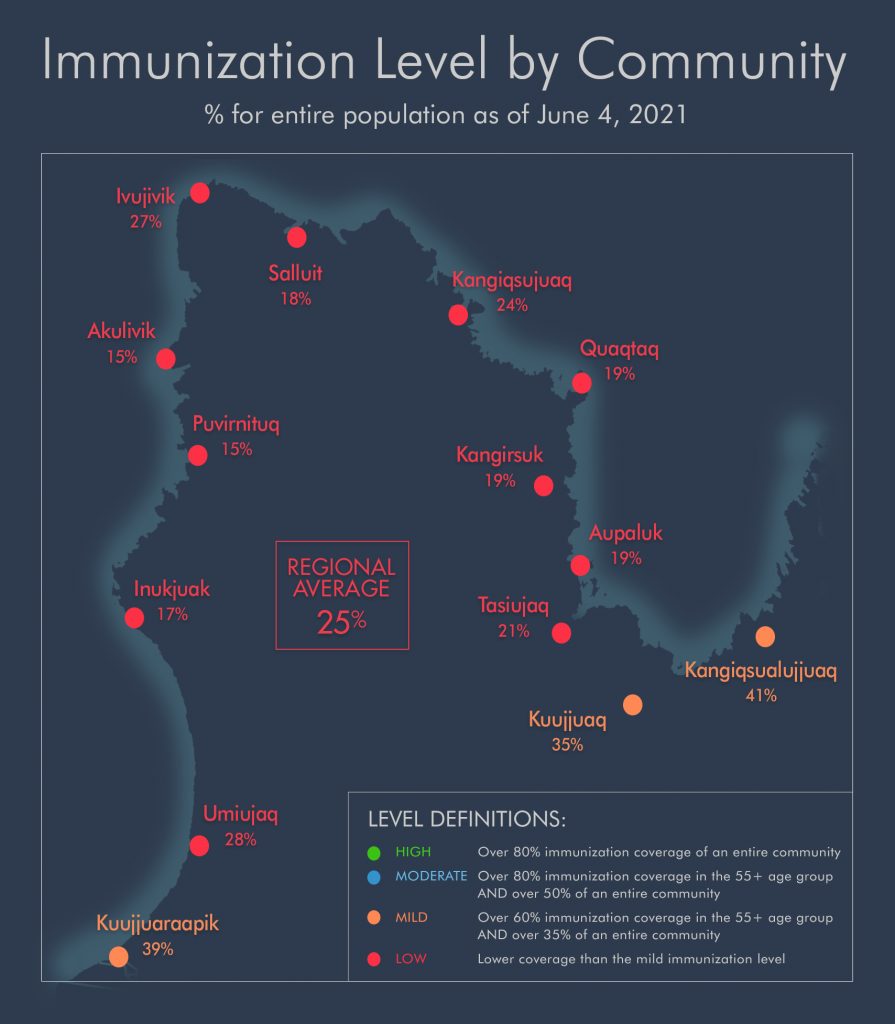
Nunavik’s young demographics, approximately one third is under 15 years old, makes it a challenge to reach the kinds of vaccination goals elsewhere in the province.
In May, Canada approved the Pfizer-BioNTech COVID-19 vaccine for children 12 to 15 years of age. Nunavik received their first shipment the week of June 14.
“We got the vaccine this month so we were not able to offer it before school ended in May, so now we’re looking for different ways to reach youth for vaccination,” Rochette said. “But because the population is so young, as long as we’re not able to vaccinate youth under 12, we won’t be able to approach the vaccination numbers of down south.”
Building trust between local communities and the health care system is another challenge, she said.
“With the residential schools [news] it’s not an easy time for people so it’s hard to reassure people that something coming from non-Inuit or non-Indigenous people is always trustworthy and that’s something we have to keep in mind,” Rochette said. “We are working with local leaders to make sure that messages about the vaccines are also being provided by local people and not just from the regional level.”
Other initiatives include holding vaccination clinics every Thursday in each of the 14 communities, with both walk-ins and appointments accepted.
“We want to protect the region,” Rochette said. “It will be a long journey to get more people to accept the vaccine but I’m confident we will eventually reach that level.”
Related stories from around the North:
Canada: Canada’s Yukon territory reports 44 new COVID-19 cases over the weekend, CBC News

